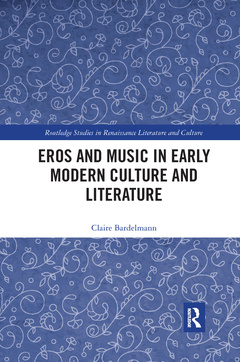Eros and Music in Early Modern Culture and Literature Routledge Studies in Renaissance Literature and Culture Series
Auteur : Bardelmann Claire

What is the relationship between Eros and music? How does the intersection of love and music contribute to define the perimeter of Early Modern love? The Early Moderns hold parallel discourses on the metaphysical doctrines of love and music as theories of harmony. Statements of love as music, of music as love, and of both as harmonic ideals, are found across a wide range of cultural contexts, highlighting the understanding of love as a cultural construct. The book assesses the complexity of cultural discourses on this linkage of Eros and music. The ambivalence of music as an erotic agent is enacted in the controversy over dancing and reflected in the ubiquitous symbolism of music instruments. Likewise, the trivialization of musical imagery in madrigal lyrics and love poetry highlights a sense of degradation and places the love-music relationship at the meeting point of two epistemes. The book also shows the symbolic deployment of the intertwined ideas of love and music in the English epyllion, and offers close readings of Shakespeare?s poems The Rape of Lucrece and Venus and Adonis.
The book is the first to propose an overview of the theoretical, cultural and poetical intersections of Eros and music in Early Modern England. It discusses the connections in a richly interdisciplinary manner, drawing on a wealth of primary material which includes rhetoric, natural philosophy, educational literature, medicine, music theory and musical performance, dance books, performance politics, Protestant pamphlets and sermons, and emblem books.
Contents
Introduction 1
Part One: Architectonics
- ‘The Bond of All Things’: Neoplatonic Ideas
of Eros and Music in the Early Modern Episteme
Theories of union: discourses of Eros and music
Classical and Christian theories of Eros and music
Speculative music and the Neoplatonic Eros as binding agents
Musical harmony in the microcosm and in the political body
Unity as poetic principle
2 Empowering Eros: Embodied Harmonies and Erotic Mediation
Eros and music as mediating agents
Sensual love and practical music as educational agents
Practical music as love’s preferred agent
The ambiguity of music’s erotic agency
The dual agency of music and the erotic ear
3 ‘Love’s proper exercice’: Eros and the dance
Erotic action and temperate dancing
The degradation of the cosmic dance:
"Sellenger’s round, or The Beginning of the World"
The erotic dancing body
The ambivalent rhetorical status of the dancing body
4 The Ambivalent Lute
The Orphic Lute
The Political Lute
The Erotic Lute
The Fair Lutenist
Part Two: Poetics
- Ideas of Eros in the Early Modern Lute Ayre and Madrigal
The ethos of the musical genres and the two Eros
Ideas of Eros in madrigal and lute song lyrics
‘Infinite Volumes’: Miscellanies of love
in Elizabethan madrigal and lute ayre lyrics
Neoplatonic ideas of love in the lyrics
The voice as erotic instrument
Rhetoric and eroticis
6 Erotic and Rhetorical Trivializations of Music in the English Epyllion
Music and Eros in the English epyllion
Natural music and the harmonic world
Erotic trivializations of music in the epyllion
‘Love is forme’: fiction and friction
- Desire as Palimpsest, or the Myth of Philomel
in Shakespeare’s The Rape of Lucrece and Titus Andronicus
Philomel as musical myth
Expressing the unspeakable: Lavinia as Philomel
Philomel, an ‘innocent Siren’?
Philomel as Failed Orpheus: Dismembering the Body Politic
8 Specularity or speculation? Echo and Eros in Venus and Adonis
Echo/echo and the music of the spheres
Transformative Encounters: Echo and the twofold nature of Eros 162 Echo and Eros in Venus and Adonis
The Speculating Echo
Conclusion
Notes
Selected Bibliography
Index
Claire Bardelmann is Associate Professor at the University of Lorraine, France, where she teaches Early Modern Drama. She has an academic background in English and Musicology. She holds an Agrégation in English, and a PhD in Musicology (Paris-Sorbonne University) which investigates the relationship between music and Early Modern literature. The author of many articles in books and journals including Cahiers Elisabéthains, she is the co-editor (with Pierre Degott) of Musique et théâtre dans les Iles Britanniques.
Date de parution : 09-2020
15.2x22.9 cm
Date de parution : 05-2018
15.2x22.9 cm
Disponible chez l'éditeur (délai d'approvisionnement : 14 jours).
Prix indicatif 160,25 €
Ajouter au panierThèmes d’Eros and Music in Early Modern Culture and Literature :
Mots-clés :
Lute Ayre; Young Man; lute; Amor Hereos; ayre; Musica Mundana; feminine; Ovids Banquet; voice; Lute Song; song; Shakespeare’s Venus; practical; Speculative Music; speculative; Feminine Voice; instruments; Canto Iii; shakespeares; Musica Speculativa; venus; Sellenger’s Round; Secular Vocal Music; Concordia Discors; Titus Andronicus; Rhetorical Echo; Sacred Vocal Music; Scipion Dupleix; Cosmic Dance; Practical Music; Apologie De Raymond Sebond; Elizabethan Erotic Narratives; Lute Strings; Natural Music; Ballad Tunes



